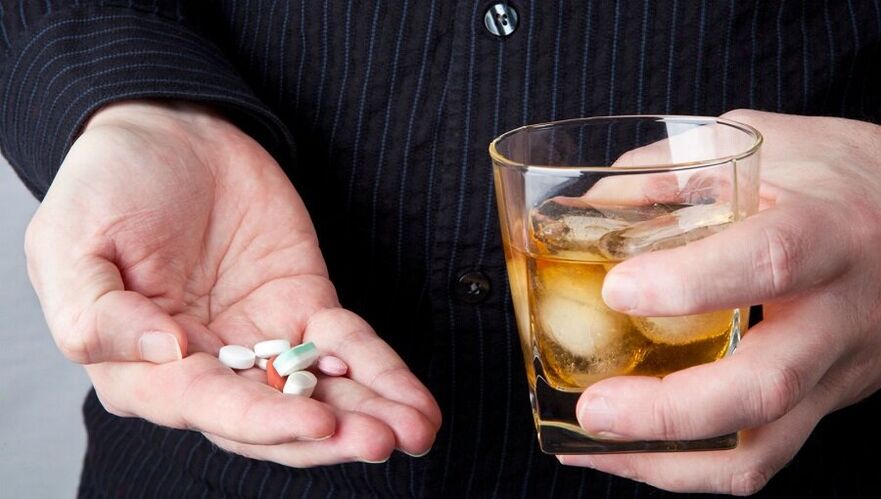Everyone knows that it is forbidden to combine alcohol and antibiotics, but few people know when you can drink alcohol after antibiotics. It is not clear how many days to wait after the last pill of the drug. Many more are wondering what will happen if you skip a couple of glasses during the treatment period or immediately after it ends. With these questions, we will try to figure it out, for which you will initially need to familiarize yourself with the effect alcohol and antibiotics have on the body.

Treatment and contraindications for alcohol
Antibiotics are not only very effective drugs, but also dangerous. Their reception must necessarily be agreed with the attending physician. The main indicator of the need for their use is the presence of a bacterial infection, which the body cannot cope with on its own.
If a specialist has prescribed antibiotics, then during the period of such treatment, some rules should be followed:
- Strictly adhere to the time and timing of taking the drug, which will maintain a constant concentration of certain substances in the blood.
- What period of time it takes to take medication should be determined by the doctor. Usually the course does not exceed 2 weeks, and some medicines are enough to use for 3 days.
- It is recommended to drink the antibiotic with clean water without gas.
- During the period of treatment, you should adhere to proper nutrition. From the diet, you need to exclude fatty foods and, of course, alcohol intake, even in small quantities.
The last rule should be especially taken into account, in particular with regard to not drinking. Moreover, it is forbidden to consume alcohol immediately and after a course of treatment for a specific period of time. But why shouldn't alcohol be consumed after antibiotic treatment? When ethanol and its constituent substances enter the body, they break down into small elements, transforming into simple compounds. And some of the molecules of the alcoholic beverage will begin to coincide with the molecules of medicines, which can cause a serious malfunction in the body.
It has been repeatedly proven that after taking alcohol, the effectiveness of antibacterial drugs is significantly reduced. Moreover, such a mixture will give a large load on the liver, which responds unfavorably not only to the work of this organ, but in general to the state of the body. Alcohol intake after antibiotics or during the course of treatment can give an unpredictable reaction of systems and organs.
Possible consequences
As already noted, taking alcohol together or immediately after taking antibacterial medications affects the entire body, not limited to its individual area, which is why it is impossible to predict the consequences. However, the most common are the following:
- If you drink alcohol when there are antibiotic substances in the body, a sharp form of allergy may appear.
- A great danger when you drink medicine is an exacerbation of intoxication and a hangover. Subsequently, the usual amount of drinking can lead to a loss of control. At the same time, there is a risk of getting a mental deviation as a result.
- Alcohol after taking antibiotics significantly reduces the medicinal effect of the latter, which may lead to the need to repeat the course of treatment or to an increase in the dose of medications, which will also adversely affect the body. In addition, an increase in the dose of drugs helps to reduce their effect in the future, and thereby the adaptation of the infection to the drug. Infection with the weakening of the antibiotic has time to get stronger and become resistant to it. Thus, after a course of antibiotics, the infection will reappear after a while, and stronger medications will be required to eliminate it.
- Also, possible consequences include such traditional symptoms as: headaches, nausea, mental blurredness, liver damage and dizziness.
All of the above consequences can be avoided if you know when you can take alcohol after an antibiotic.
What deadlines do you need to adhere to?
There is no exact statement about how long after taking antibiotics it is possible to consume alcoholic beverages. For each antibacterial drug, it is individually determined how many days after treatment you can drink alcohol, and this must be determined by the doctor. As a rule, this period is at least 10 days. This is the minimum period during which the kidneys and liver of a person return to normal, as well as the intestinal microflora is restored. However, these are general recommendations, it all depends on the characteristics of the organism.
If the patient has a chronic kidney or liver disease, then the time after how long it is possible to drink alcohol is slightly increased. And in order to avoid mistakes, it is better to consult a specialist on this issue. The longer after the course of treatment do not consume alcoholic beverages, the better it will be for the body. After all, alcohol and so does not carry anything useful for the body, and even more so during the period of its weakening.
Today, the main contraindications were studied about whether it is possible to drink alcohol during the period of antibiotic treatment, as well as general terms regarding abstinence from alcohol, which should be adhered to.
Observing these recommendations and rules, it will be possible not only to quickly get rid of the disease with the help of antibiotics, but also not to harm the body. But it is important to remember that drinking antibiotics without a doctor's prescription is also prohibited.
























